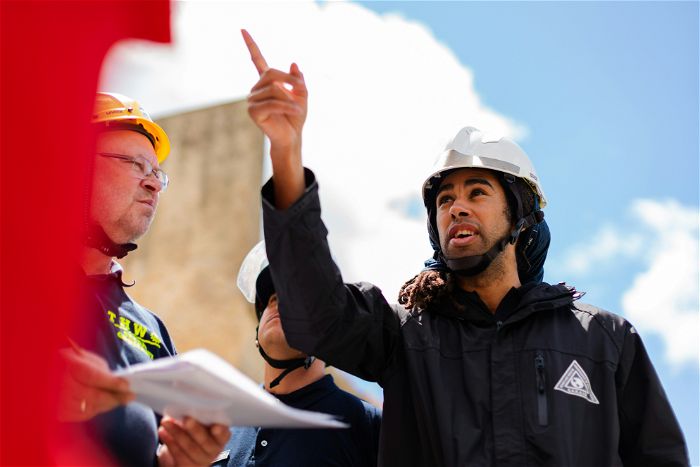In an era of rapid climate change with wide-ranging impacts, it’s imperative to both address environmental challenges and foster a just transition to a green economy. We must work urgently to not only combat the root causes of climate change but also to create accessible, equitable, and quality jobs that can sustain our future.
Because many of these jobs are yet to be discovered, while more–established jobs are evolving and transforming to better support sustainability, we need to broaden our focus beyond the relatively small sector of existing “green jobs.” Instead, we should focus on a set of emerging green skills that are shaping roles and responsibilities across a range of jobs and industries as we transition to a more sustainable economy.
Jobs for the Future’s (JFF) recent report, Growing Quality Green Jobs, developed in partnership with the Burning Glass Institute with support from the Ares Charitable Foundation, illuminates the intersection of environmental sustainability and economic progress while providing insights into the green skills that warrant immediate attention in training and workforce development.
Green Transformation Cycle: Redefining Green Jobs
The report’s central premise challenges conventional notions of green jobs that focused only on the greenest portions of the economy, such as renewable energy production and natural resource conservation, and on roles such as chief sustainability officer that have high barriers to entry. Informed by an analysis of nearly 200 million online job postings, the report introduces the “Green Transformation Cycle,” a data-driven framework designed to propel our nation toward an economy that prioritizes environmental sustainability and equitable economic growth. It starts with a crucial insight: green jobs are more widespread than commonly believed. The framework underscores the importance of integrating green skills into various occupations and showcases the ongoing transformation to a green economy.
Let’s delve deeper into the key takeaways:
- Expanding the Definition of Green Jobs: The concept of a just transition hinges on broadening our understanding of green jobs and the skills required to build a climate-resilient future. For instance, the job of computer network support specialist, not commonly viewed as a green job, is in fact becoming a role that supports sustainability with power supply management, and energy management. By intentionally integrating green skills and knowledge, all jobs have the potential to become quality green jobs.
- Equity and Job Quality: The future of green jobs presents an opportunity to challenge traditional methods of assessing jobs to ensure that the transition to a sustainable economy is inclusive and equitable. In addition to identifying green jobs that offer living wages, we need to focus on roles that offer strong, broad-based job quality and are more accessible to people who face systemic barriers to advancement.
Accordingly, we must not only ask what jobs will be green and deserve economic investment, but we must also consider how to effectively prepare workers and learners for this transition. At JFF, we believe and argue in this report that centering our efforts around durable green skills will help workers readily adapt to changing job requirements in an evolving economy.
Green Skills: The Driving Force
To achieve a just transition to a green economy, it’s crucial to understand the nature of the skills that ultimately drive jobs to become green. In our report, we identify three levels of green-skill integration:
- Additive Skills: Some jobs will acquire a small subset of new green skills within their existing scope of responsibilities. These additive green skills will expand job roles but not fundamentally change them—so workers must be prepared to expand their knowledge over time. For example, new green skills in environmental compliance or energy conservation might be added to the traditional functions in jobs such as a quality control analyst or a network and computer systems administrator.
- Blended Skills: Jobs adopting broader sets of new green functions within existing roles experience blended effects by retaining some original tasks while taking on new ones. One example of a blended role might be a machinery maintenance technician who uses new skills in structural systems installation or environmental data management to maintain more efficient and environmentally friendly power plants or water treatment facilities. Jobs at the blended level add additional functions and evolve over time to be more green—so workers must be prepared for new tasks and work to be added to their job descriptions.
- Job-Changing Skills: Finally, some roles will undergo a significant shift in skill sets, leading to a complete change in functions due to the full integration of green skills. Skills driving these changes might include environmental monitoring or management of continuous emissions monitoring systems. At this level, skills are fundamentally changing how work is done, such as someone in transportation management moving from managing the flow of goods and shipping to optimizing routes and packing processes for the lowest emissions and making system-level decisions to reduce carbon impacts.
Identifying the most impactful skills to support an increasingly green economy and developing training and transition models around those skills will allow workers and employers to navigate these job changes with stability.
Leveraging Skills to Meet Our Opportunity for a Just Transition
Achieving a more equitable transition to a green economy will not happen spontaneously. It will take concerted efforts from leaders and stakeholders in workforce systems, education, training pathways, policymaking, and community development. To achieve this, we must prioritize workforce development that aligns with long-term environmental and social impacts. For example, we should use information about scaling skills to shape career pathways for traditionally nongreen jobs to prepare workers for transitions into the green economy, and expand community-based training programs to better reach populations systemically blocked from access to and advancement in these career paths.
By breaking down barriers in defining green jobs and promoting the intentional integration of green skills, we can transform all jobs into quality green jobs. This approach simultaneously addresses issues of job access and equity, working to close the racial and gender gaps that persist in the green economy.
As our economy adapts to the challenges of climate change, the Green Transformation Cycle framework serves as a valuable resource to prepare workers for a just transition. It paves the way for a strong, equitable, and accessible green economy that benefits everyone.



